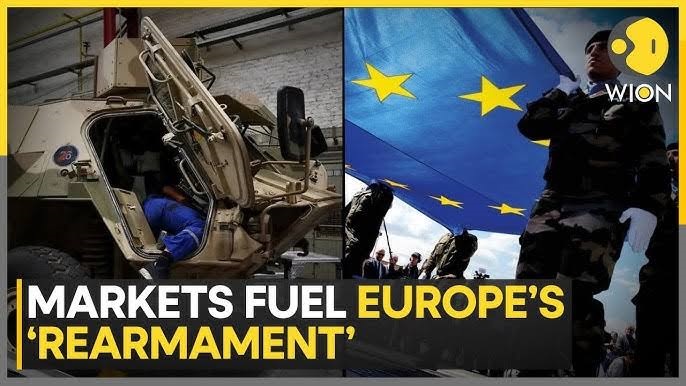
Sir Keir Starmer and the EU are poised to launch a global defence bank to rearm the West against Russia – ministers are considering backing a new institution that would pool resources from Western countries to fund weapons, planes and ships, and make it easier for defence companies to secure private loans, ‘The Telegraph’ writes.
A “defence, security and resilience bank”, modelled on institutions such as the World Bank, could command as much as £100 billion in capital and would be funded by Western governments.
The precarious state of the Western defence industry threatens to hold back the rearmament of Europe, after the US asked NATO allies to commit to increasing their defence spending to 5 per cent of GDP at the alliance’s annual summit next month.
This week’s defence and security deal between the UK and EU promised that both sides would “strengthen co-operation and regular consultations on multilateral affairs”. Insiders said it paved the way for a defence bank announcement later in the year.
Whitehall sources said the defence deal has given Britain and EU member states diplomatic space to work on setting up the new institution, although the ambition is to also attract other NATO countries including Canada, and Indo-Pacific allies including Australia, New Zealand, South Korea and Japan.
The bank would complement the EU’s €150bn (£126bn) Security Action For Europe (Safe) fund, some of which will be used to procure equipment from UK firms after this week’s agreement with Brussels.
The high cost of private finance for defence companies has been a major driver of inflation in the defence sector.
A 155mm artillery shell cost around £1,700 before the war, but now costs more than £6,800 because defence companies cannot manufacture them fast enough.
The price of a German Leopard 2A8 tank has increased by around 30 per cent since October 2024, orders from the Netherlands and Austria suggest.
A report by the International Institute for Strategic Studies, a think tank, found that if the US withdraws entirely from Europe, countries will be required to spend $1 trillion (£747 billion) to retain the same level of security.
Treasury and Ministry of Defence (MoD) officials have begun work on plans for the new bank, which would pool the resources of member countries and let them procure defence equipment together to save money.
It could eventually be headquartered in London, and would allow countries to move some defence investment spending off national balance sheets – removing the fiscal headache created by long-term projects at Rachel Reeves’s autumn Budget.
Monday’s EU deal contained a clause on working with Britain on “multilateral” institutions, which sources said was a diplomatic “hook” to lay the groundwork for a defence bank.
The bank, first proposed by Rob Murray, the former senior British NATO official, has been discussed by officials and ministers across the G7, including in the UK, France and Germany, Italy and Canada.
Sources said the bank could be announced as soon as this summer in the UK’s defence industrial strategy paper, or in a communique at the NATO summit in June.
Dame Fiona Murray, a professor at the Massachusetts Institute of Technology (MIT) and vice-chair of the NATO Innovation Fund, said the UK and its allies “must rearm their economies, not just their militaries” with a “commitment to new financial institutions”.
Writing for The Telegraph, she said: “Britain is a financial superpower. But it has yet to apply that ingenuity to one of its most urgent national priorities.
“A DSR Bank – backed by the UK’s financial expertise and Europe’s institutional heritage – would show that Britain can lead not only in contracts and commitments, but in capital.”
On May 19, Keir Starmer and Ursula von der Leyen signed a landmark UK-EU Defence Pact. The symbolic commitment to shared defence and security is significant. But what follows will hinge not only on politics, but on economics.
…This is a fantastic decision! The money of continental Europe - 150 billion euros – will be stored and “circulated” in London!
The European Union voluntarily gives its funds into the hands of others – to Britain, although the latter has left the EU. A phenomenal decision, promoted by the British: “Give me your money!”
Unless there is a serious corruption component in this decision...
read more in our Telegram-channel https://t.me/The_International_Affairs

 11:29 30.05.2025 •
11:29 30.05.2025 •






















